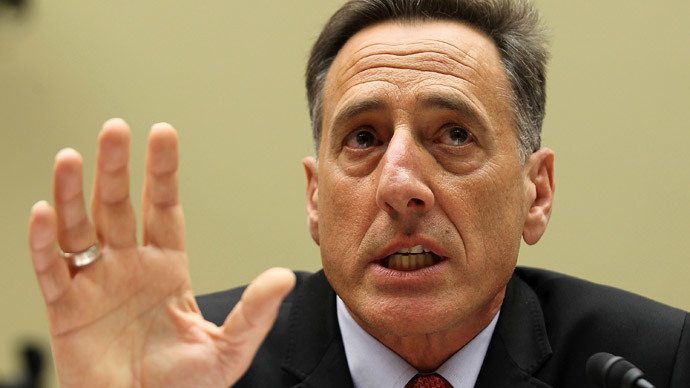Vermont governor signs first in US GMO-labeling law to go into effect

Vermont will become the first state to enact a law requiring labels on foods with genetically modified ingredients after the governor signed the bill into law on Thursday afternoon. The bill will go into effect in July 2016.
"I am proud of Vermont for being the first state in the nation to ensure that Vermonters will know what is in their food. The Legislature has spoken loud and clear through its passage of this bill," Gov. Peter Shumlin (D-Vt.) said in a statement after the bill passed. "I wholeheartedly agree with them and look forward to signing this bill into law.”
The Leg. has spoken: #Vt'ers deserve to know what is in their food. I agree and look forward to signing the #GMO labeling bill into law.
— Peter Shumlin (@GovPeterShumlin) April 23, 2014
However, the law may not withstand legal challenges from major food companies like Monsanto Co. and DuPont Co - the leading producers of GMO crops. They are widely expected to sue the state over the law. To defend the legislation, Vermont allocated a $1.5 million legal defense fund in the measure, to be paid for with settlements won by the state. However, even this amount might not be enough to cover the state’s legal bills.
As RT reported, Monsanto, DuPont, Kraft Foods Co. and others previously led the charge against the similar labeling legislation in California and Washington state, grossly outspending supporters of the measure that was eventually defeated in both states, with anti-labeling groups spending $22 million of the $28 million total spent on that campaign in Washington.
“There is no doubt that there are those who will work to derail this common-sense legislation,” Shumlin said. “But I believe this bill is the right thing to do and will gain momentum elsewhere after our action here in Vermont.”
The Center for Food Safety says there are currently 63 active genetically modified organism (GMO) labeling bills in 23 states, and 32 bills have been introduced since January, the Guardian reports. A bill that would require labels on food products containing ingredients from genetically modified crops passed a hurdle in the New York Assembly Thursday morning. Maine and Connecticut are the only US states that have passed GMO labeling laws, though their proposals would only go into effect if and when surrounding states also pass similar laws. GMO labeling is required in 64 countries, including the European Union.
"Companies shouldn't be able to do an end run by slapping a ‘natural’ label on a product that contains GMOs as, unfortunately, they are allowed to do today," Urvashi Rangan, executive director of the Consumer Reports Food Safety and Sustainability Center, said according to the Guardian. "Leave it to the state of Vermont to pick up where the FDA has left off when it comes to defining natural."
Opponents of GMO labeling laws argue the labels would create a false perception that the foods are unhealthy, despite a lack of scientific evidence, Hillshire Brands Co. Chief Executive Officer Sean Connolly told Bloomberg in an interview. If the labeling is going to be required, he would prefer the regulations come from the federal government.
The Washington Post looked into ways the food industry might mount a legal challenge, and ways labeling proponents may counter those arguments:
The first argument is that requiring GMO labeling is a violation of commercial free speech rights under the First Amendment, and that states don’t have the ability to restrict commercial speech. Those that favor getting information on genetic engineering to consumers could argue the label conveys “purely factual information in support of a legitimate government interest,” according to a memo to the Post from Emord & Associates, a food and drug law firm. The state will have to prove that it meets four requirements to limit commercial speech. A labeling law will likely pass either test, the Post says.
GMO producers might argue that federal law trumps state law. In April, Congress introduced a bill that would ban states from implementing their own labeling laws when it comes to food containing genetically engineered ingredients. But that bill has not passed, and the Post’s legal analysis found that the bill is not preempted by federal law.
Monsanto and its fellow GMO proponents might also say the Vermont law interferes with interstate commerce. The courts would have to consider whether the bill explicitly favors commerce within the state over commerce between states, as well as whether any burden on interstate commerce - which the Post says the increased cost of GMO labeling would be - are fairly balanced with local benefits within the state. Labeling advocates point to the benefits of protecting public health and the environment.
But Connolly, the Hillshire CEO, disagrees that those benefits outweigh the increased cost burden. “If you put yourself in the shoes of a manufacturer, it’s not a practical concept,” he told Bloomberg. “You can’t have customized labels state by state. That would dramatically drive up the cost to consumers even higher, which is certainly not in their best interest when there’s nothing wrong with the ingredients to begin with.”
But not all food makers are against the idea. Ben & Jerry’s, the Vermont-based ice cream company with a history of supporting hormone-free and natural ingredients, supports the state’s law. “As the campaign to label food products made with GMO ingredients moves across the states, including Vermont, Ben & Jerry’s is proud to stand with the growing consumer movement for transparency and the right to know what’s in our food supply by supporting mandatory GMO labeling legislation,” their website says.
Transitioning ingredients to non-GMO is complex. We break it down using a pint of Phish Food. http://t.co/rrT7tGYrYLpic.twitter.com/0SIuOBw87c
— Ben & Jerry's (@benandjerrys) April 30, 2014
The company gave away free ice cream at the bill signing.
.@GovPeterShumlin speaking at the signing ceremony for the Vermont #GMO labeling bill. We LOVE #VT ! pic.twitter.com/X8vmb7k5ea
— Ben & Jerry's (@benandjerrys) May 8, 2014
Despite the potential legal challenges, Vermont’s legislators overwhelmingly voted for GMO labeling. The state House of Representatives approved the bill by a vote of 114-30, while the state Senate passed the legislation by a vote of 28-2.
"I just don't have the scientific background to understand the complexity of the issue and don't really need to. I represent the people, and their will was made overwhelmingly clear," Democratic state Rep. Paul Ralston told the Guardian about why he voted for the bill. "It's a basic principle of the right to know. That's the primary reason."














